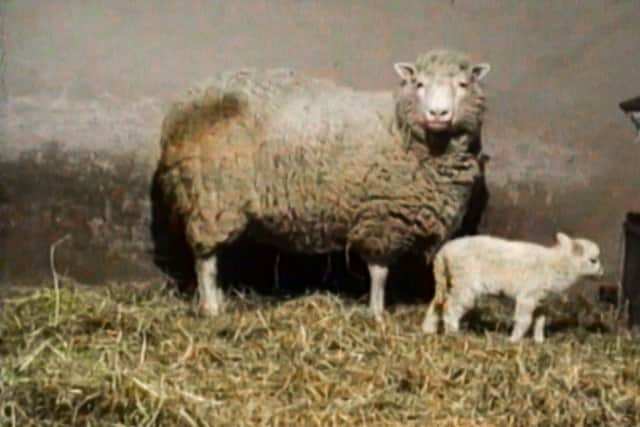Dolly: The Sheep that Changed the World!
and live on Freeview channel 276
One newspaper described it as a “birth in a barn that shook the world”, as TV news crews rushed to rural Scotland and the then American President Bill Clinton demanded to be kept abreast of events.
When Dolly the Sheep was born on Friday, July 5, 1996, her arrival not only caused great excitement, it also opened a Pandora’s Box of ethical questions.
Advertisement
Hide AdAdvertisement
Hide AdThis Horizon documentary combines privileged access and never-before-seen archive to tell the story of how a tiny band of boffins on a farm in the hills above Edinburgh cracked the holy grail of modern science.


We hear from the scientists originally trying to develop better methods for producing genetically modified livestock, who, despite being acutely aware of the public’s suspicion into their work, eventually created the clone.
Dolly was the first mammal to have been successfully cloned using a cell taken from an adult of its own species.
DNA from the mammary gland of a six-year-old Finn Dorset ewe was injected into an unfertilised egg from a Scottish Blackface ewe that had its own DNA removed – creating an embryo.
Advertisement
Hide AdAdvertisement
Hide AdThe test tube sheep was ‘concocted’ by embryologists Karen Walker and Bill Ritchie, working alongside biologist Keith Campbell at the Roslin Institute animal sciences research centre.
Karen and Bill became known as Dolly’s mum and dad, with Karen keeping test tube Dolly warm in her bra on the way from the farm to the institute.
Named after country singer Dolly Parton, the sheep was born to her Scottish Blackface surrogate mother at the institute’s nearby Dryden Farm.
It was only when her white face and furry legs emerged – markings unique to the Finn Dorset sheep – that they knew the experiment had been a success.
Advertisement
Hide AdAdvertisement
Hide AdUp to that point, there had been 277 attempts to clone Dolly and there were many miscarriages.
Like a real dad, Bill leapt with joy when Dolly took her first steps. “I got very attached to her,” he said.
“I’d take people down to the farm to see her and I would shout, ‘Morning Dolly.’
“Without fail, I’d get a ‘baaah’ back, so she at least knew her name although she might also have been excited to be getting fed.”
Advertisement
Hide AdAdvertisement
Hide AdKaren added: “Dolly was like the Naomi Campbell of the sheep world. She was photogenic and would rise to the occasion when visiting scientists arrived.”
The team’s long term vision was to develop treatments for heart disease, Parkinson’s Disease and rheumatism.
However, their goals and methods raised concerns from some church and anti-abortion groups.
They wanted the technology banned but, following strong lobbying by the medical research community, parliament permitted therapeutic cloning but banned the cloning of humans.
Advertisement
Hide AdAdvertisement
Hide AdIn the 25 years since Dolly’s birth, a cloning industry has paved the way for medical breakthroughs including stem cell treatment.
In 2018, Sir Ian, now 76, announced he had Parkinson’s, one of the many diseases he hoped Dolly might help cure.
Karen said: “For me, I do feel disappointed that Dolly’s birth hasn’t led to the amazing cures I hoped it would.”
Dolly gave birth to several lambs but developed severe arthritis and a lung disease that led to her being put down in 2003.
Advertisement
Hide AdAdvertisement
Hide Ad“She did get quite fat because there were so many people visiting her and they would always give her treats,” Bill said.
A quarter of a century on, neither the hopes treatments for debilitating diseases nor the fears of designer babies and a dystopian future have been realised.
Dolly’s birth changed scientific thinking forever – but the question still remains: what is her legacy?
A message from the Editor:
Thank you for reading this story on our website. While I have your attention, I also have an important request to make of you.
Advertisement
Hide AdAdvertisement
Hide AdIn order for us to continue to provide high quality and trusted local news on this free-to-read site, I am asking you to also please purchase a copy of our newspaper whenever you are able to do so.
Our journalists are highly trained and our content is independently regulated by IPSO to some of the most rigorous standards in the world. But being your eyes and ears comes at a price. So we need your support more than ever to buy our newspapers during this crisis.
With the coronavirus lockdown having a major impact on many of our local valued advertisers - and consequently the advertising that we receive - we are more reliant than ever on you helping us to provide you with news and information by buying a copy of our newspaper when you can safely.
You can also enjoy unlimited access to the best news from across Northern Ireland and the UK by subscribing to newsletter.co.uk
Advertisement
Hide AdAdvertisement
Hide AdWith a digital subscription, you can read more than five articles, see fewer ads, enjoy faster load times, and get access to exclusive newsletters and content. Visit https://www.newsletter.co.uk/subscriptions now to sign up.
Thank you